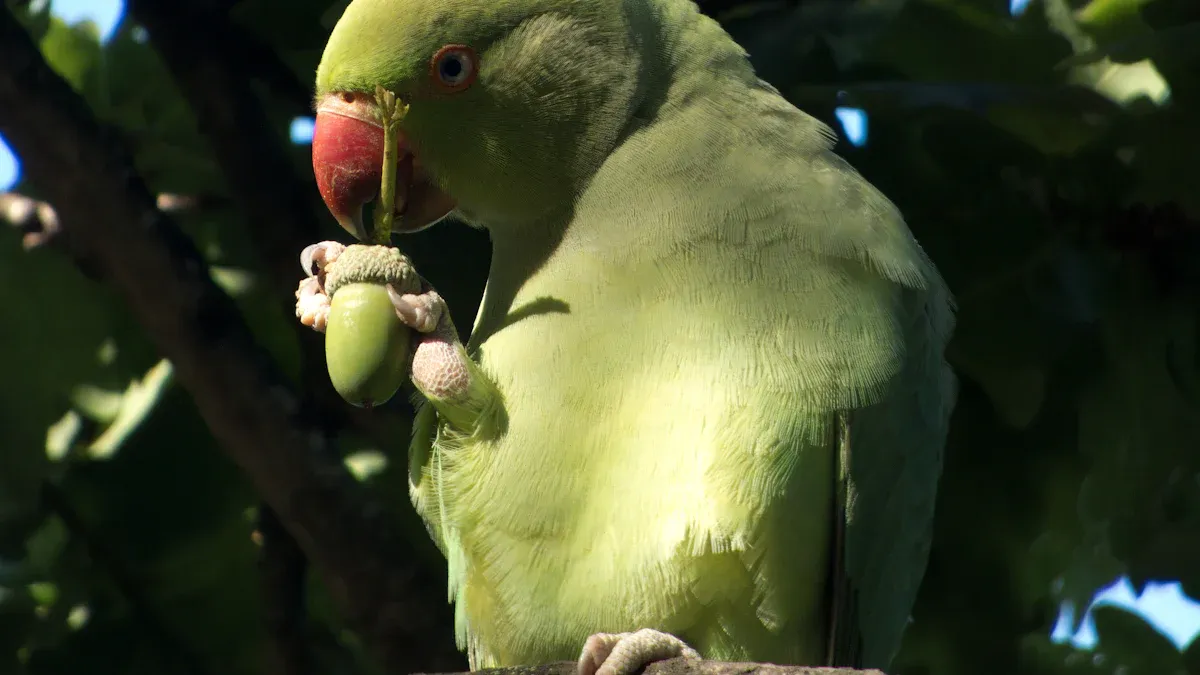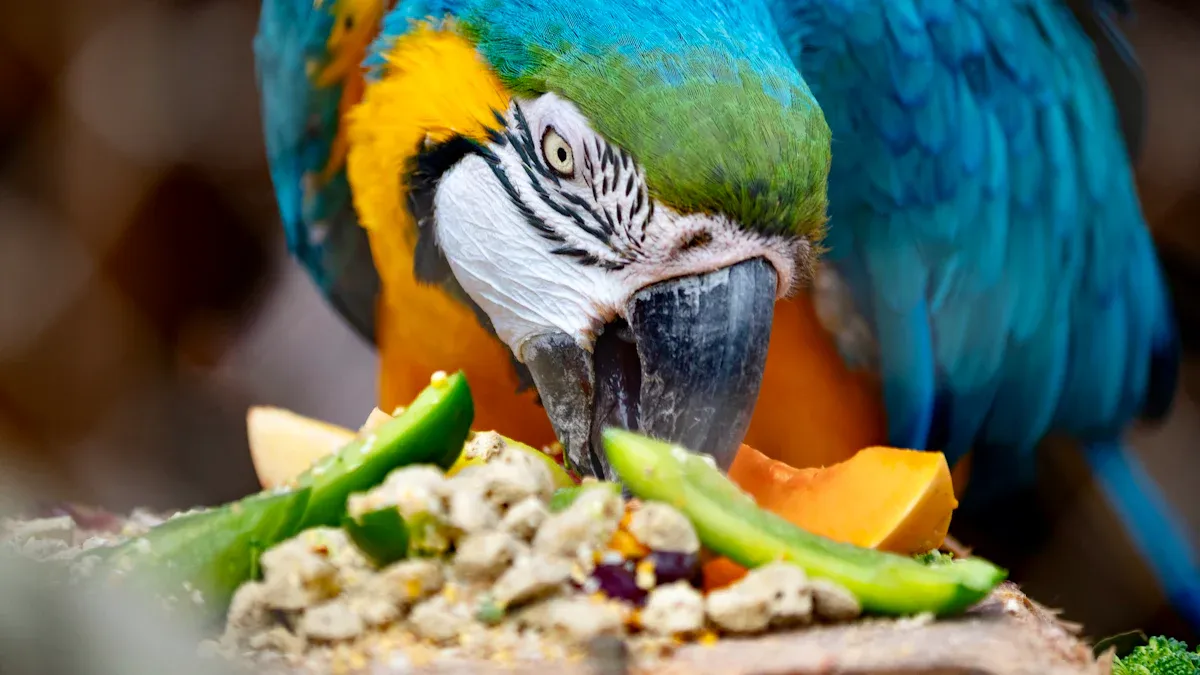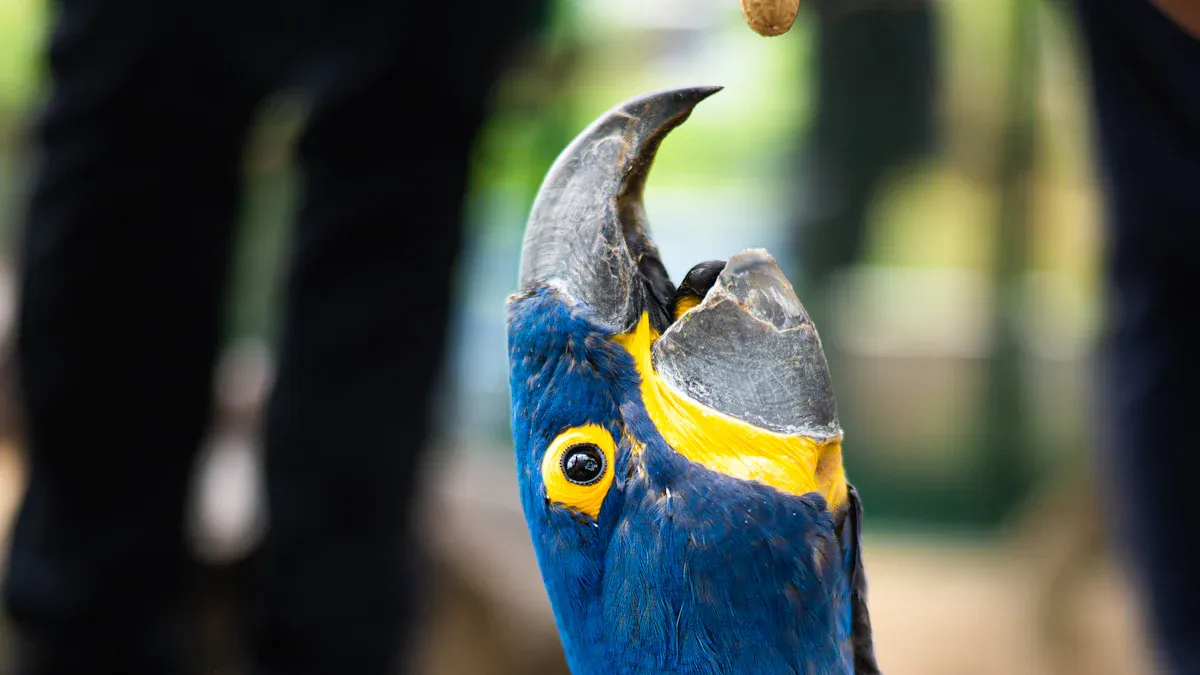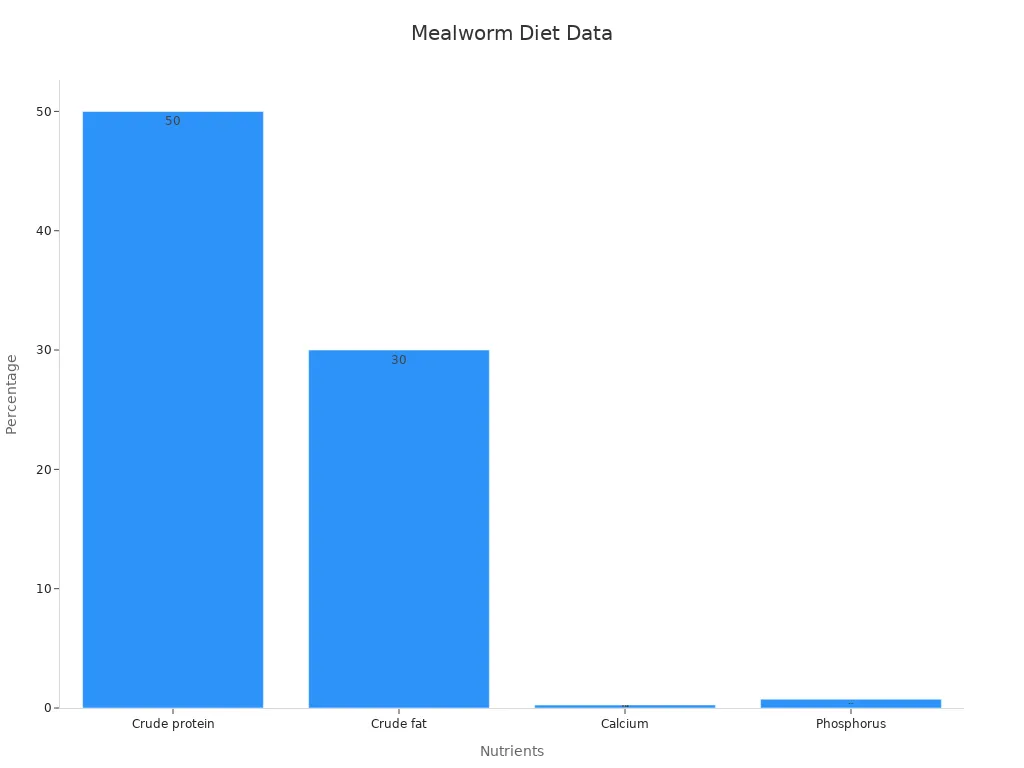
Mealworms for pet parrots offer a powerhouse of nutrition, boosting muscle growth and feather health. Studies show dried mealworms provide up to 65% protein and healthy omega-3 fats.
| Nutrient | Content Range (%) |
|---|---|
| Protein | 45-65 |
| Fat | 25-45 |
Parrots thrive with this delicious, natural treat.
Key Takeaways
- Dried mealworms provide high protein and healthy fats that support muscle growth, feather health, and energy in parrots.
- Offer mealworms as a treat two to three times a week, adjusting the amount based on your parrot’s size to avoid overfeeding.
- Combine mealworms with fruits, vegetables, and other protein sources to ensure a balanced diet and complete nutrition for your parrot.
Mealworms for Pet Parrots: Nutritional Value and Health Benefits

Complete Protein and Essential Amino Acids
Mealworms for pet parrots deliver a powerful protein punch. Scientific studies show that dried mealworms contain about 51.4% crude protein on a dry matter basis. This high protein content helps parrots build strong muscles and repair tissues. The protein in mealworms includes many essential amino acids, which are the building blocks for healthy growth and feather development. However, some amino acids like lysine and tryptophan are present in lower amounts. Parrots need a variety of foods to get all the amino acids they require. When mealworms are part of a balanced diet, they help parrots thrive and stay active.
Tip: Combine mealworms with other protein-rich foods to ensure your parrot receives a complete range of amino acids.
Healthy Fats, Vitamins, and Minerals
Mealworms for pet parrots also provide healthy fats, which are important for energy and shiny feathers. Dried mealworms contain about 30% fat, including omega-3 fatty acids that support brain function and skin health. They offer B-vitamins, such as thiamin, which help keep parrots alert and energetic. Mealworms supply some vitamin A in the form of β-carotene, but parrots may need extra vitamin A from other foods. The mineral content in mealworms includes iron and zinc, which support immunity and feather growth. However, calcium and manganese levels are low, so parrots benefit from mineral-rich fruits and vegetables alongside their mealworm treats.
| Nutrient / Aspect | Mealworms (per kg) | Notes on Impact for Parrot Health |
|---|---|---|
| Crude Protein | 186 g | Supports muscle and tissue health |
| Crude Fat | 82 g | Provides energy and helps maintain healthy feathers |
| β-carotene (Vitamin A precursor) | Lower than crickets and superworms | Contributes to vitamin A intake; may need supplementation |
| B-vitamins (including thiamin) | Variable; thiamin lower than previous reports | Important for energy and nerve health |
| Calcium | Less than 50% of poultry requirements | Low; supplement with other calcium sources |
| Iron | 17-54% of poultry requirements | May need additional sources |
| Manganese | Low | Supplementation recommended |
Guaranteed Analysis of Dried Mealworms
Dried mealworms stand out as a nutrient-rich treat for parrots. Research shows that their crude protein content ranges from 43.3% to 60.2%, often higher than traditional protein sources like soybean meal. The fat content can reach up to 45%, providing plenty of energy for active birds. Mealworms also contain dry matter, ash (minerals), crude fiber, and carbohydrates. These nutrients work together to support a parrot’s daily needs. The nutritional profile of dried mealworms makes them a smart choice for owners who want to boost their parrot’s diet with a natural, wholesome product.
| Nutrient Component | Approximate Percentage | Benefit for Pet Parrots |
|---|---|---|
| Crude Protein | ~50% | Muscle development and tissue repair |
| Fats | ~30% | Energy and feather health |
| Micronutrients | Various | Feather growth, immunity, and overall health |
Supporting Growth, Immunity, and Feather Health
Mealworms for pet parrots play a key role in supporting growth, strong immunity, and beautiful feathers. The high protein content helps young parrots grow and adult birds maintain muscle mass. Healthy fats and vitamins in mealworms keep feathers glossy and skin soft. Minerals like zinc and iron help parrots fight off illness and recover quickly. When owners add dried mealworms to their parrot’s diet, they encourage natural foraging behaviors and spark excitement at mealtime. Parrots become more active and engaged, showing off their vibrant colors and lively personalities.
Note: For best results, offer dried mealworms as part of a varied diet that includes fresh fruits, vegetables, and seeds. This ensures your parrot receives all the nutrients needed for a long, healthy life.
How to Safely Add Dried Mealworms to Your Parrot’s Diet

Introducing Mealworms for Pet Parrots
Parrots love to explore new foods. Introducing dried mealworms can spark curiosity and excitement at mealtime. Experts agree that dried mealworms are safe and nutritious for parrots. These treats offer more than 50% protein and about 27% fat, along with important vitamins and minerals. Parrots have a unique digestive system that handles dried insects well. Their two-part stomach grinds and processes mealworms easily, so owners do not need to worry about digestive issues. Wildlife rehabilitators have seen many healthy birds thrive on diets that include dried mealworms. When owners introduce mealworms slowly, parrots adapt quickly and enjoy the new taste and texture.
Tip: Start by offering a few dried mealworms mixed with your parrot’s favorite foods. Watch for signs of interest and excitement.
Recommended Serving Size and Frequency
Mealworms for pet parrots work best as a supplement, not a main course. Experts recommend offering dried mealworms two to three times per week. Serving size depends on the size and age of the parrot. For small parrots, one to two mealworms per feeding is enough. Larger parrots can enjoy up to five mealworms at a time. Owners should always observe their birds and adjust portions as needed. Too many mealworms can lead to weight gain, so moderation is key. Dried mealworms provide a boost of protein and energy, making them perfect for active or growing birds.
| Parrot Size | Serving Size (per feeding) | Frequency |
|---|---|---|
| Small (budgies, lovebirds) | 1-2 mealworms | 2-3 times/week |
| Medium (cockatiels, conures) | 2-4 mealworms | 2-3 times/week |
| Large (African greys, macaws) | 3-5 mealworms | 2-3 times/week |
Note: Always provide fresh water and remove uneaten mealworms after feeding.
Tips for Balanced Nutrition and Variety
A healthy parrot diet includes many different foods. Mealworms for pet parrots add protein and healthy fats, but parrots also need fruits, vegetables, seeds, and grains. Experts suggest combining mealworms with other protein sources to fill any nutrient gaps. Owners can add nutritional yeast for B-vitamins and use mineral supplements, especially calcium, to support strong bones and eggshells. The chart below shows the nutrient profile of dried mealworms, highlighting their strengths and areas where supplementation helps.

Mealworms contain about 50% protein and 30% fat, with essential amino acids like lysine and threonine. Calcium and phosphorus are present, but calcium levels are lower than some other foods. Owners can balance the diet by adding leafy greens, cuttlebone, or mineral blocks.
- Combine mealworms with other protein-rich foods.
- Supplement with B-vitamins and minerals.
- Offer a colorful mix of fruits and vegetables daily.
- Rotate treats to keep mealtime exciting and nutritious.
| Nutrient | Mealworms (%) | Benefit for Parrots |
|---|---|---|
| Protein | 50 | Muscle and feather growth |
| Fat | 30 | Energy and shiny feathers |
| Calcium | 0.25 | Bone health (needs supplement) |
| Phosphorus | 0.74 | Metabolism and energy |
A varied diet helps parrots stay healthy, active, and happy. Owners who offer mealworms as part of a balanced meal plan see brighter feathers, stronger birds, and more playful personalities.
Dried mealworms offer a safe, nutritious boost for any parrot’s daily routine. Mealworms for pet parrots deliver protein and healthy fats that support vibrant feathers and strong bodies.
- Studies in other birds show mealworms improve growth, gut health, and immunity.
Start small, observe your bird, and enjoy the benefits of a balanced diet.
FAQ
Can all parrots eat dried mealworms?
Yes! Parrots of all sizes can enjoy dried mealworms. Owners should adjust the serving size for each bird. Every parrot deserves a healthy, exciting treat.
How should owners store dried mealworms?
Store dried mealworms in a cool, dry place. Keep the container sealed. This keeps mealworms fresh and ready for your parrot’s next meal.
Can dried mealworms replace other foods in a parrot’s diet?
No. Dried mealworms work best as a supplement. Parrots need a variety of foods for complete nutrition. A balanced diet brings out their brightest colors and happiest personalities.
Tip: Rotate treats and offer fresh fruits and vegetables daily for the healthiest, happiest parrot.


